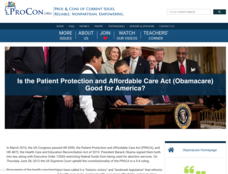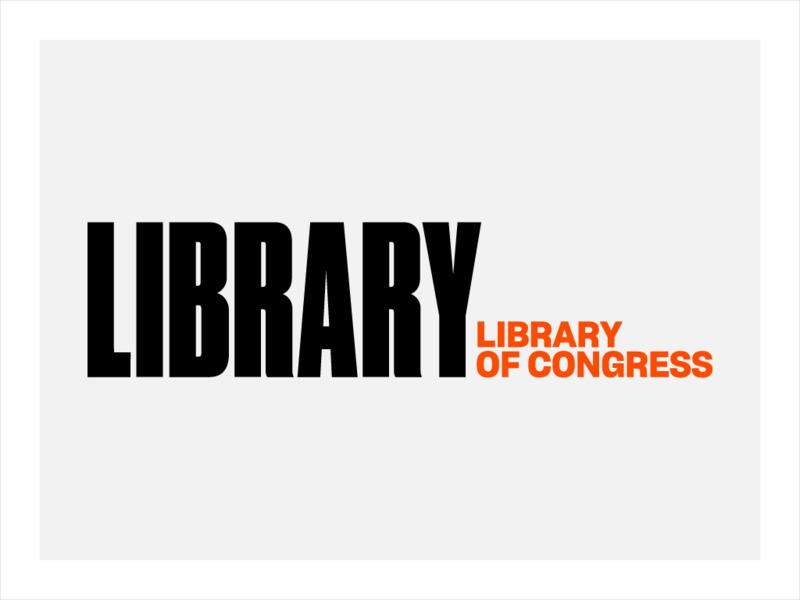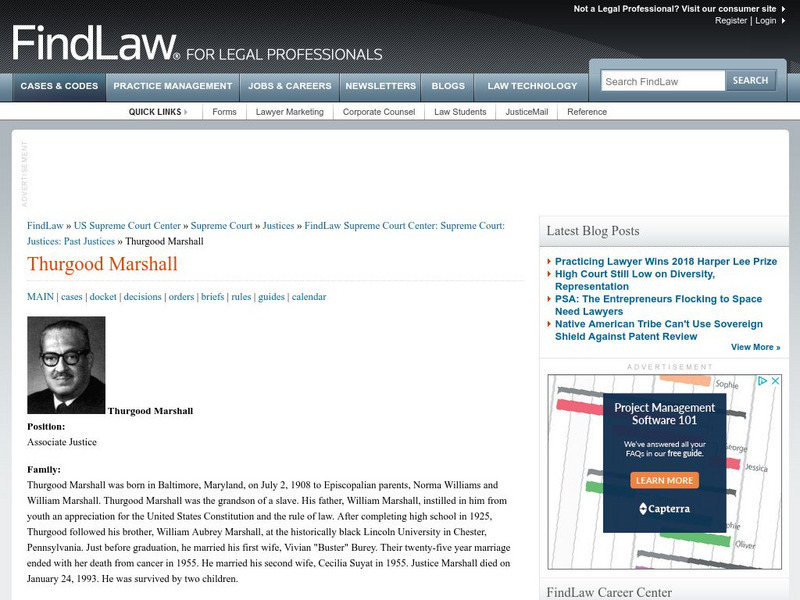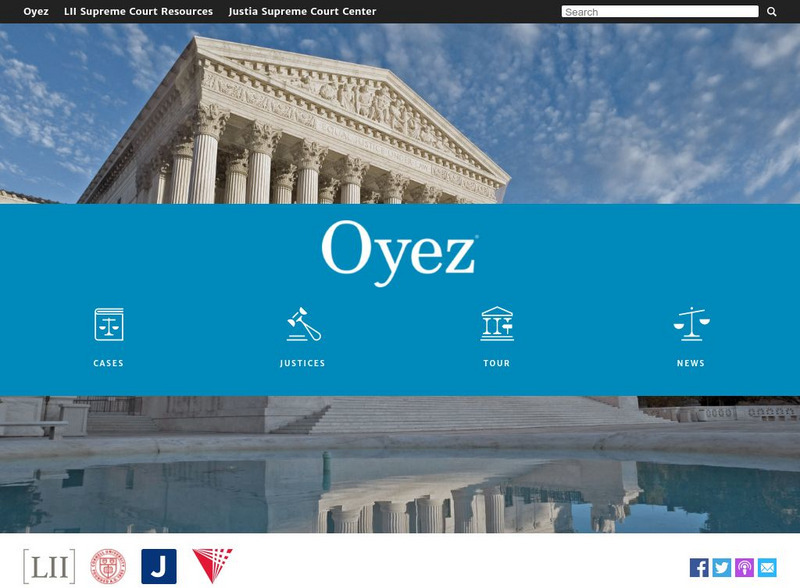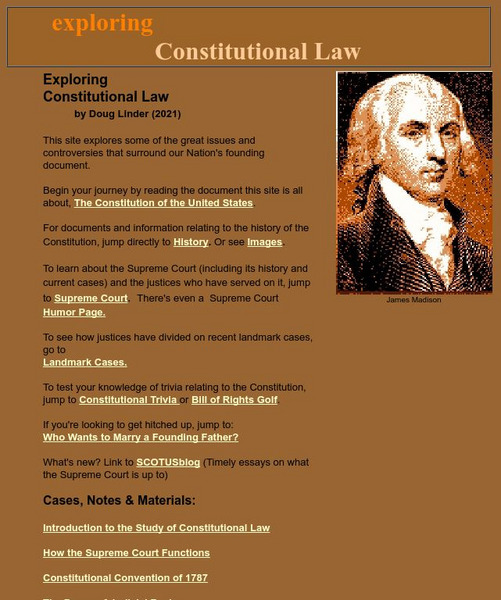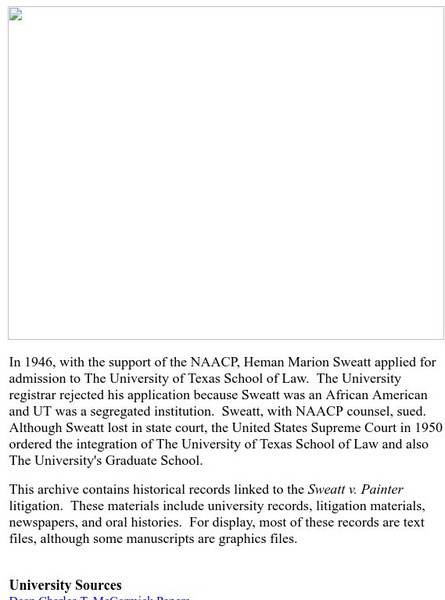Judicial Learning Center
The U.S. Supreme Court
How do Supreme Court justices determine which cases to consider? What happens when the Supreme Court decides not to take a case? The lesson explores important questions and others in the field of criminology. It focuses on the...
Judicial Learning Center
Levels of the Federal Courts
The Supreme Court gets all the glory, but very few federal cases make it to the highest court. An interesting lesson explores the structure of the lower levels of the federal court system. In addition to outlining the organization of...
Judicial Learning Center
Why Study Landmark Cases?
Why study landmark Supreme court cases? A helpful lesson offers a brief but valuable argument for the importance of these cases in the field of criminology. It introduces scholars to some key terms necessary for studying court cases and...
Judicial Learning Center
Your 4th Amendment Rights
Americans love to learn about their rights, especially those that protect them from the government's power to invade their privacy. Young people are especially engaged by this topic. An informative lesson explores four Supreme Court...
Judicial Learning Center
Types of Court Cases
How can one court acquit someone of a crime, while another convicts the person of the same one? It's all because of the differences between civil and criminal trials. An informative resource provides scholars in the field of criminology...
Judicial Learning Center
The Power of Judicial Review
Marbury v. Madison is arguably the most important landmark case in the history of the Supreme Court. A fact-filled lesson provides background information about the case and two others related to the concept of judicial review. Scholars...
Judicial Learning Center
About Federal Judges
Not just anybody can do the job of a federal judge, but according to the United States Constitution just about anybody can be appointed. The lesson outlines the process and requirements for becoming a federal judge, focusing on the...
Judicial Learning Center
The Constitution
Supreme Court justices debate the meaning of the US Constitution, but we expect teachers to explain it to scholars with far less training and experience. A daunting task for sure, but it's not insurmountable with resources that simplify...
Judicial Learning Center
Article III and the Courts
What's the best way to make sense of the Constitution? A helpful lesson contains both the text of Article III and annotation of each of its sections, breaking it down into easy-to-understand parts. It also includes links to a...
Judicial Learning Center
Your 1st Amendment Rights
Why should classes care about the First Amendment? An engaging lesson serves as a powerful tool for answering just that. As all four cases in the lesson relate directly to freedom of expression in schools, young scholars explore the...
Judicial Learning Center
Judicial Independence
Most people support the idea of an independent judiciary in theory until they hear about a court case that violates their principles. An informative resource explains why the concept is important. It also provides scholars of criminology...
ProCon
Gun Control
According to some estimates, there are more guns than people in the United States. Learners decide if America should enact more gun control laws. They analyze information about gun deaths in the United States by year, read about the...
ProCon
Gay Marriage
The first legal gay marriage in the United States occurred in Massachusetts in 2004. Since then, countless others have tied the knot. Scholars decide whether gay marriage should be legal by reading a history of the issue, analyzing the...
ProCon
Obamacare
Former President Barack Obama reformed the United States' health care system with Obamacare, but is the new legislation good for America? Scholars read a historical timeline about the passage of health care reform laws and compare United...
ProCon
Student Loan Debt
Should college loan debt be easier to discharge in bankruptcy? Scholars sort through the top three pros and cons to decide for themselves in preparation for a class debate or discussion. Learners may also participate in an online poll to...
Other
Supreme Court of the United States
The official site for the Supreme Court of the United States provides information on the dockets, the rules, and the opinions of the Court. Also of interest is the information on the Supreme Court judges and on the building itself. Be...
Other
Ccja: Guide to the Federal and Texas Bill of Rights and Individual Freedoms
This guide contains excerpts and annotation for four historical government documents: the Federal Bill of Rights, the United States Constitution, the current United States Supreme Court Justices, and the Bill of Rights from the Texas...
Scholastic
Scholastic: Role of the Supreme Court
This essay describes the power of the Supreme Court to 'check' the actions of both the President and Congress, with some historic documentation.
Annenberg Foundation
Annenberg Learner: Democracy in America: The Courts: Our Rule of Law
This unit provides a comprehensive look into the value of the U.S. court system as a means to maintain the safety of American citizens. Offers video, readings, web resources, and activities.
Library of Congress
Loc: Sonia Sotomayor
Sonia Sotomayor was nominated to the United States Supreme Court by Barack Obama in June of 2009, and confirmed in August of 2009. Official documents and articles related to Sontomayor can be accessed through the links provided here....
Thomson Reuters
Find Law: Supreme Court Justices: Thurgood Marshall
Here is an overview of the life and career of Thurgood Marshall (1908-1993), an advocate for civil rights and the first African-American Supreme Court justice. Read about Marshall's family, education, and career in law and government.
Illinois Institute of Technology
Oyez Project
The OYEZ Project is a vast multimedia relational database on the U.S. Supreme Court that contains abstracts for all leading constitutional decisions of the Court, authoritative oral arguments in streamed media format, and a 360-degree...
University of Missouri
Exploring Constitutional Conflicts: Exploring Constitutional Law
Although the Constitution is the supreme law of the land, its interpretation is open to many opinions, causing great controversies. Students can read the Constitution as well as the many issues that surround the document. If that proves...
Other
Sweatt v. Painter Archive
This site has just about everything one might want to know in an investigation of the important Supreme Court decision in Sweatt vs. Painter.













